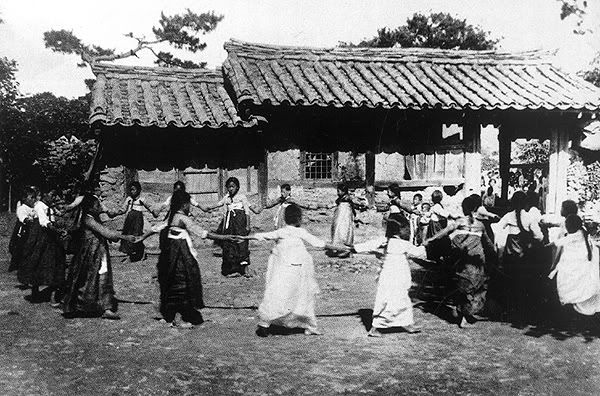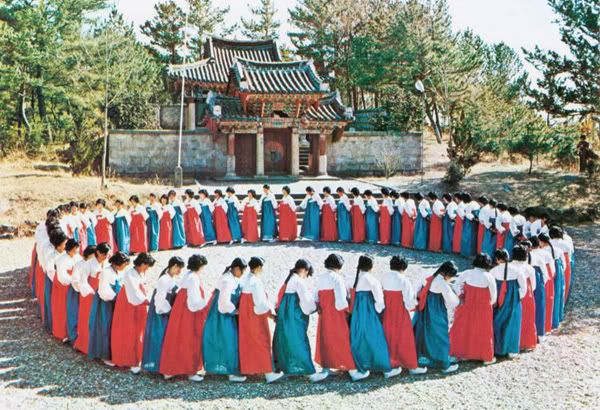On Chuseok -- Ganggangsullae
Having been busy over the past two days I missed the chance to write about a few Chuseok-related things that caught my interest. One of these is Ganggangsullae - 강강술래 (姜降戌來) or 강강수월래 (强羌水越來) in Korean* - a type of circular dance that is commonly associated with Chuseok and the region of Jeollanam-do. There are basically two stories of how the dance originated, but both of them involve women gathering together in hanbok - traditional Korean clothing - to dance under the light of the full moon.

Ganggang-sullae from 조선닷컴 - 뉴스플러스
Ganggangsullae was designated as Important Intangible Cultural Properties No. 8 by the Cultural Heritage Administration (CHA) on February 15, 1965 and was added to UNESCO's list of Intangible Cultural Heritage of Humanity at the start of the month (October 1, 2009). There were four additional cultural properties from Korea that were included in the list, which I hope to discuss at a later time. They are: the Jeju Chilmeoridang Yeongdeunggut shaman ritual, Namsadang Nori mask dance, Yeongsanjae Buddhist ceremony, and Cheoyongmu Daoist ritual -- which I mention in this entry.
The more easily-verified origin to the Ganggangsullae dance traces back to the late sixteenth century. Quoting from my copy of Annual Customs of Korea, Choe Sang-su writes:
A tradition tells us the origin of this play. More than three centuries ago, during Hideyoshi's invasion of Korea, Admiral Yi Sunsin and his naval force fought the Japanese force. Ladies near the battle field gathered in groups on the hills along the coast and sang the gang-gang-sullae around bonfires to give the enemy the impression that there were huge guard forces along the coast and also to watch out for the enemy.
There are slightly different accounts depending on which source one consults - for example, Arirang suggests Admiral Yi had the women dress in military uniforms - but they all agree that the women involved in the Ganggangsullae played an important role in fooling the Japanese leadership into believing the Korean forces were much larger than was actually the case.

Ganggang-sullae from 한국경제
The second account of its origins comes from Seasonal Customs of Korea:
On the other hand, there are those who claim that the origin of ganggang-sullae dates back to a much earlier time when ancient tribal groups engaged in moon worship. Fearful of the dark, the light of the full moon freed the people from this fear, for which they gave thanks to the moon in a ritual circle dance, with the circles symbolizing the full moon. It is possible that Admiral Yi took advantage of this ancient custom in devising his ingenious deception by coordinating the sending of his troops ashore with the performance of festive dancing.
The singing and dancing begin slowly and the dance often features a lead singer who stands in the center of the circle as the other participants form a circle and hold hands. As time progresses the singing and dancing increase in speed and the circle itself may change shape. The women who took part in this dance were forced to abide by constricting social mores, which led to the song's lyrics focusing on the hardships they faced in life or, as the previously-cited Arirang article points out, "They also sang about lovers and their wishes to be dutiful daughters to their parents."

Ganggang-sullae from Make provision against smallpox. (I kid you not.)
As with any folk song in Korea there is a fair amount of variation from one region to another -- the Smallpox website lists a verse from both a general Jeollanam-do version as well as one from Jindo at the very bottom of their entry. Meanwhile, here are some English verses provided by Annual Customs in Korea:
Many stars crowding in the sky,
Gang gang sullae
Friends are good and the ground is good.
Gang gang sullae
Pine leaves crowding in the pine woods.
Gang gang sullae
Bamboo leaves in the bamboo field.
Gang gang sullae

Music from Edupia
And for anyone who has made it this far here are a couple of older photographs depicting Ganggangsullae:

Ganggangsullae from Dolbegae

Ganggangsullae from e영상역사관

Ganggangsullae from NATE 사전
Edited 06 May 2010: For a video of Ganggangsullae being performed as part of Gyeongju's Daeboreum festivities earlier this year I would highly recommend checking out this page on Gyeongjublog.com
* I am baffled by the fact that the names on Wikipedia use completely different hanja (Chinese characters) for 'Ganggang'. Also, take a look at this passage from Annual Customs of Korea:
Then what does the word 'gang-gang-sullae' mean? Gang gang does not imply the Chinese characters meaning 'the strong enemy' but is pure Korean and is in the local dialect of Jeolla area meaning 'circumstances' or 'round'; and 'sullae' also does not imply the Chinese character meaning 'coming over the water' but is derived from the word 'sulla' meaning 'patrolling' so means 'to look out, round'. The reason of doubling the word 'gang' (round) seems to be nothing but the emphasis on the 'look out'. And sometimes the word 'sullae' is written as 'suweol lae' because one is apt to hear it so when it is intoned slowly and prolonged. (please insert one large sic here.)
Based on Choe Sang-sun's explanation it sounds like their shouldn't be a hanja name in the first place. However, between the two ('sullae' and 'suweollae') it's the second that includes the Chinese character for water (水). The characters given for 'sullae' are 戌 (the zodiac symbol of the dog; in Japanese kanji it refers to 'the hour of the dog' between 7pm and 9pm) and 來 (to come, return) -- which don't strike me as a very accurate description. (But what do I know? I am by no means a scholar in Chinese characters ...)
The first version of 'gang-gang' listed on Wikipedia is a combination of 姜 (the family name Kang; ginger) and 降 (descent, descending, lower, surrender). The second version includes 强 (strong, powerful, energetic) and 羌 (Qing nationality; the Chinese surname Qiāng or Ch'iang -- although I will note that it isn't included in Naver's online dictionary. [Looked it up in their English dictionary, so no surprise it didn't show up!]) Does that mean that both hanja transcriptions on Wikipedia are incorrect? Is this a good example of Wikiality?
The Colbert ReportMon - Thurs 11:30pm / 10:30cThe Word - Wikialitywww.colbertnation.comColbert Report Full EpisodesPolitical HumorMichael Moore
(Nice jab at Oregon, by the way.)